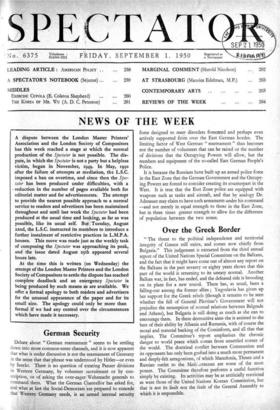Over the Greek Border
" The threat to the political independence and territorial integrity of Greece still exists, and comes now chiefly from Bulgaria." This judgement is extracted from the third annual report of the United Nations Special Committee on the Balkans, and the fact that it might have come out of almost any report on the Balkans in the past seventy or eighty years shows that this part of the world is returning to its uneasy normal. Another Balkan war, in fact, has ended, and the defeated side is brooding on its plans for a new round. There has, as usual, been a falling-out among the former allies ; Yugoslavia has given up her support for the Greek rebels (though it remains to be seen whether the fall of General Pla'tiras's Government will not prejudice the resumption of normal relations between Belgrade and Athens), but Bulgaria is still doing as much as she can to encourage them. In these destructive aims she is assisted to the best of their ability by Albania and Rumania, with of course the moral and material backing of the Cominform, and all that that implies. The Committee's report emphasises the chronic danger to world peace which comes from unsettled corner of the world. The doctrinal conflict between Communism and its opponents has only been grafted into a much more permanent and deeply-felt antagonisms, of which Macedonia, Thrace and a Russian outlet to the Medi ,rranean are some of the most potent. The Committee therefore performs a useful function simply by existing. Its activities may be as artificially restricted as were those of the United Nations Korean Commission, but that is not its fault nor the fault of the General Assembly to which it is responsible.










